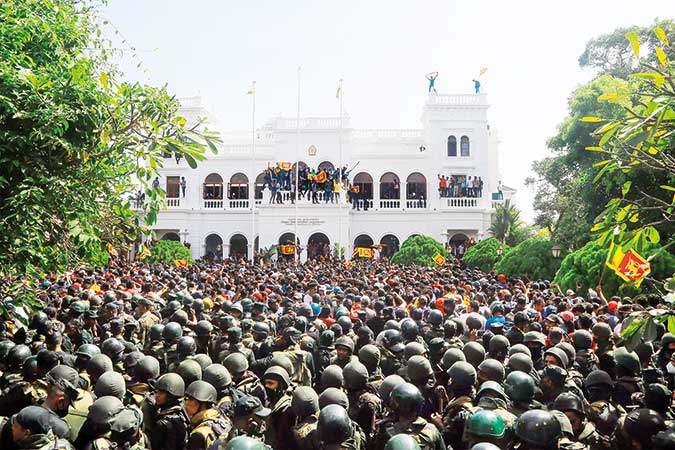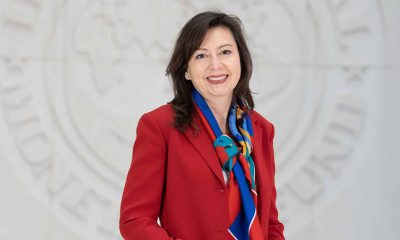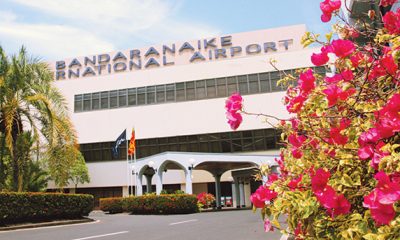News
President-toppling Sri Lanka activist girds for new revolt

By Amal JAYASINGHE
A Sri Lankan jail witnessed a rare moment of accord last year when both prisoners and guards clamoured to greet its newest inmate: the man who toppled the island nation’s president.Student leader Wasantha Mudalige remains lionised by many for channelling public anger at an unprecedented economic crisis into a movement that shook the foundations of Sri Lanka’s political system.
At the height of last summer’s unrest, he helped spearhead a siege of government buildings in Colombo that saw once-loved president Gotabaya Rajapaksa chased into a humiliating exile.The 29-year-old, whose cherubic face belies his history of fierce confrontations with riot police, spent months behind bars on terror charges for his efforts.
“We had a very warm welcome,” Mudalige told AFP outside a court appearance in June, while recounting his arrival at jail alongside two confederates.
“Even the prison guards were very supportive. They saw us as the heroes who got rid of Gota.”
Mudalige said his incarceration was a necessary “sacrifice” in the unfinished battle to reform Sri Lanka’s political system.Now free on bail, he said lingering economic woes have left Sri Lanka bristling with discontent, frustrated with its new president — and ready for another revolt.
“Although we got rid of Gota, we have not been able to win the ‘system change’ that we demanded,” Mudalige said.
“We don’t think the government can go on for long,” he added. “When you analyse the situation, there is no way the government can continue.”
As head of the Inter-University Students’ Federation (IUSF) at the time, Mudalige stood at the forefront of last year’s street protests.Alongside him was a broad coalition of saffron-robed Buddhist monks, minority activists and ordinary citizens outraged by government corruption and mismanagement of the island’s worsening economic tailspin.
“They had no alternative but to take to the streets because they had no fuel, no food, no electricity… people were dying in petrol queues,” Mudalige said.
In July the IUSF and its allies laid siege to the Presidential Palace in Colombo.Rajapaksa, once lauded by the island’s Sinhalese majority for helping crush a decades-long Tamil separatist insurgency, was forced to evacuate the residence through a secret backdoor and temporarily fled the country.
Protesters streamed through the compound, gaping at its opulent furnishings and frolicked in its pool in the revelry that followed.
Rajapaksa’s successor, Ranil Wickremesinghe, quickly sought to restore order by directing police to arrest the movement’s leaders.Mudalige was caught in the dragnet the following month when police snatched him off the street as he left a demonstration against the crackdown.
He spent 167 days in custody, the longest stretch of detention of all those who participated in last year’s revolt.The most serious charges against him were eventually dropped after Amnesty International and other rights groups condemned his jailing.
Wickremesinghe has sought to restore Sri Lanka’s ruined finances with an International Monetary Fund bailout that commits his administration to an austerity programme.
The chronic food and fuel shortages that inflamed public anger last year have since ended as the government reined in public spending.But steep tax hikes, and the end of generous subsidies on electricity and fuel, have been deeply unpopular.Wickremesinghe says the reforms are necessary to bring Sri Lanka out of bankruptcy and restore economic growth.
He pledged in February to press ahead “regardless of the obstacles that anarchist political forces seek to create”.
His administration has maintained a tough line against protests, with periodic demonstrations quickly dispersed by tear gas and water cannon trucks.Mudalige said his detention and that of other protest leaders was an effort by the government to forestall a repeat of last year’s unrest.But he warned the public’s frustrations over the spiralling cost of living would inevitably bring people back to the streets, unbowed by the threat of violence.
“The government is using the police and the military to suppress any dissent. It is like pressing down a rubber ball in a basin of water,” he said.
“You can’t do it for long. It will inevitably bounce to the top.”
News
US sports envoys to Lanka to champion youth development

The U.S. Embassy in Colombo welcomed the U.S. Sports Envoys to Sri Lanka, former National Basketball Association (NBA) and Women’s National Basketball Association (WNBA) players Stephen Howard and Astou Ndiaye, from June 8 through 14.
The Public Diplomacy section of the U.S. Embassy said that it would launch a weeklong basketball program intended to harness the unifying power of sports, made possible through collaboration with Foundation of Goodness and IImpact Hoop Lab.
While in Sri Lanka, Howard and Ndiaye, both retired professional basketball players, will conduct a weeklong program, Hoops for Hope: Bridging Borders through Basketball. The Sports Envoys will lead basketball clinics and exhibition matches and engage in leadership sessions in Colombo and Southern Province for youth aged 14-18 from Northern, Uva, Eastern and Western Provinces, offering skills and leadership training both on and off the court. The U.S. Envoys will also share their expertise with the Sri Lanka Basketball Federation, national coaches, and players, furthering the development of basketball in the country. Beyond the clinics, they will collaborate with Sri Lankan schoolchildren to take part in a community service project in the Colombo area.
“We are so proud to welcome Stephen and Astou as our Sports Envoys to Sri Lanka, to build on the strong people-to-people connections between the United States and Sri Lanka,” said U.S. Ambassador Julie Chung. “The lessons that will be shared by our Sports Envoys – communication, teamwork, resilience, inclusion, and conflict resolution – are essential for leadership development, community building, equality, and peace. The U.S. Sports Envoy program is a testament to our belief that sports can be a powerful tool in promoting peace and unity.”
News
Rahuman questions sudden cancellation of leave of CEB employees

SJB Colombo District MP Mujibur Rahuman in parliament demanded to know from the government the reasons for CEB suspending the leave of all its employees until further notice from Thursday.
MP Rahuman said that the CEB has got an acting General Manager anew and the latter yesterday morning issued a circular suspending leave of all CEB employees with immediate effect until further notice.
“We demand that Minister Kanchana Wijesekera should explain this to the House. This circular was issued while this debate on the new Electricity Amendment Bill was pending. There are many who oppose this Bill. The Minister must tell parliament the reason for the urge to cancel the leave of CEB employees,” the MP said.However, Speaker Mahinda Yapa Abeywardena prevented Minister Wijesekera responding to the query and said that the matter raised by MP Rahuman was not relevant.
News
CIPM successfully concludes 8th Annual Symposium

The Chartered Institute of Personnel Management (CIPM) successfully concluded the 8th Annual CIPM Symposium, which took place on 31st May 2024. Themed “Nurturing the Human Element—Redefining HRM in a Rapidly Changing World,” the symposium underscored the pivotal role of human resource management (HRM) in today’s dynamic global landscape. Since its inception in 1959, CIPM has been dedicated to advancing the HR profession through education, professional development, and advocacy, solidifying its position as Sri Lanka’s leading professional body for HRM.
Ken Vijayakumar, the President of the CIPM, graced the occasion as the chief guest. The symposium commenced with the welcome address by the Chairperson, Prof. Arosha Adikaram, followed by the Web Launch of the Symposium Proceedings and Abstract Book by the CIPM President. The event featured distinguished addresses, including a speech by Chief Guest Ken Vijayakumar, President of CIPM, and an address by Guest of Honor Shakthi Ranatunga, Chief Operating Officer of MAS Holdings Pvt. Ltd., Sri Lanka.
The symposium also featured an inspiring keynote address by Prof. Mario Fernando, Professor of Management and Director of the Centre for Cross Cultural Management (CCCM) at the University of Wollongong, Australia.
Vote of Thanks of the inauguration session was delivered by Dr. Dillanjani Weeratunga, Symposium Co-chair.
The symposium served as a comprehensive platform for researchers to present their findings across a wide range of critical topics in HRM. These included Cultural Diversity and Inclusion, Talent Development and Retention, Ethical Leadership and Corporate Social Responsibility, Adapting to Technological Advancements, Mental Health and Well-being at Work, Global Workforce Challenges, Employee Empowerment, and Reskilling and Upskilling.
The plenary session was led by Prof. Wasantha Rajapakse. Certificates were awarded to the best paper presenters during the valedictory session, followed by a vote of thanks delivered by Kamani Perera, Manager of Research and Development.
The annual symposium of CIPM was a truly inclusive event, attracting a diverse audience that spanned undergraduates, graduates, working professionals, research scholars and lecturers. This widespread interest highlights the symposium’s significance in the field of HRM, offering a unique opportunity for everyone to network and learn from scholarly brains.The CIPM International Research Symposium was sponsored by Hambantota International Port, Sri Lanka Institute of Information Technology (SLIIT), E B Creasy & Co. PLC, and Print Xcel Company.
























